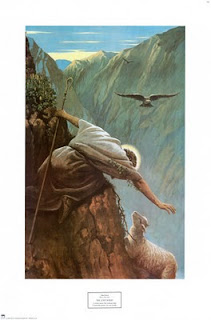 Reading for Sunday October 3, 2010: Lamentations 1:1-6 and Lamentations 3:19-26 or Psalm 137 • 2 Timothy 1:1-14 • Luke 17:5-10-The 19th Sunday after Pentecost
Reading for Sunday October 3, 2010: Lamentations 1:1-6 and Lamentations 3:19-26 or Psalm 137 • 2 Timothy 1:1-14 • Luke 17:5-10-The 19th Sunday after Pentecost
It is worth making sure that the little section of gospel that we read this week
should fill out the whole story
It tells us two straight forward things
First, we are to have faith.
Second , we are to go about our ordinary business.
It is interesting that these two ideas are juxtaposed because it reminds that it is not a question of
faith OR day to day to life
But a reminder that both go hand in hand
In the centre of the passage (vv 5-6) we read
The apostles said to the Lord, ‘Increase our faith!’ The Lord replied, ‘If you had faith the size of a mustard seed, you could say to this mulberry tree, “Be uprooted and planted in the sea”, and it would obey you.
It seems clear from the context that Jesus is expressing some disappointment at the apostles' lack of faith
And it is easy to be distracted by what he says
thinking that what Jesus is saying we should aim for
is to be miracle workers.
I don't think if we look at the whole passage that this is the guts of what he says.
He says first of all...
Don't cause other people to stumble
and he particularly says
Don't cause the little ones to stumble.
We might wonder who these 'little ones' are
it's possibly more than children, but it certainly includes children,
Then he says you must forgive those who repent,
every time they do so.
What we are seeing here is just a simple day to day application
of what it means to live the life of faith
...care for the "little ones" who are vulnerable
and put the forgiveness of sins into practice.
Then at the end of the section (vv 7-10)
he gives a couple of example about how slaves and servants
should not expect to be treated with kid gloves
we should do...what we ought to have done
So there are two little ideas.
Faith is practised, and transmitted to the young
It is about putting things like forgiveness into practice
And there is the reminder that what we, as God's servants, are required to do
is to do what we ought to do.
Caught in the middle
In between these there is a little chip from Jesus
‘If you had faith the size of a mustard seed, you could say to this mulberry tree, “Be uprooted and planted in the sea”, and it would obey you' Jesus is chiding his disciples fro not actually having faith.
If you had just a little bit ..he says...things would be different
He is not saying the life of faith is different from your day to day life
rather he is saying, I suggest,
that your day to day life is to be lived out in the spirit of faith
and it will bear a different and abundant kind of truth!
Forgiveness, caring for the 'little ones'
even going about what we 'ought to do'
are not put aside
so that we can live a different life
called FAITH
but they are rather the very vehicles wherein faith is worked out.
THIS WEEK
We might look at what it is that we do day to day
and ask God to show us where we can be more faithful
As Paul writes again to Timothy this week
we hear Paul telling Timothy to go about his day to day duties
and to not be afraid to see this as faith.
What we can expect is that if we do this even with the tiniest little bit of faith
then it will be abundantly, wildly fruitful.
Where can we allow God
to show us that our work
our family life
our duties
our joys and our burdens
are acts of faith.
Ask the Holy Spirit to show you how you can be more faithful
in what you ought to do.
And as Paul says, to have the courage to it
for God did not give us a spirit of weakness
but a spirit of courage to be faithful.



